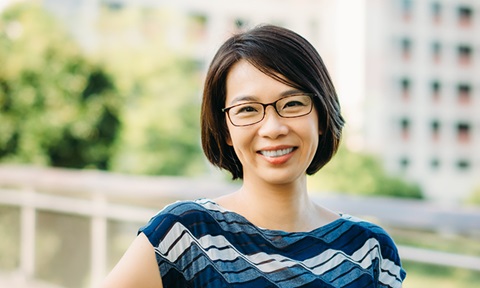We got tuition for our children to help them, not because we are swayed by ads, say parents
SINGAPORE – Some tuition centres promise the moon about what their programmes can do, while others predict doom for students who do not get their help, but many parents are not biting.
The Straits Times spoke to more than 15 parents, who said that advertising is not what spurs them to get tuition for their children or to choose a particular centre or tutor.
Instead, their reasons include helping their children in their academic areas of weakness, increasing their exposure to a second language, and giving them an added push before the year-end or other national examinations.
Mr Ron Tan, 40, a legal counsel, said that both his pre-schoolers, aged four and six, attend weekly lessons at Berries, a Chinese language centre, to prepare them for mother tongue lessons when they eventually enter primary school.
“Berries does not advertise. (Its reputation) is (spread) usually by word of mouth, which is how we got to know of it,” he said.
Apart from the curriculum, he enrolled his children at the centre because it is close to his home and the timing of the classes suits his family’s schedule.
Mr Zuriel Zhuo, 44, said his two sons have had Chinese language tuition since they were in lower primary school. His elder boy, a 16-year-old Secondary 4 student, has been taking online Chinese lessons since he was in Primary 2. His Primary 5 son, 11, has been attending Chinese classes at Mavis Tutorial Centre since he was in Primary 1.
Asked why he picked Mavis Tutorial, which has been around since 1986, he said: “It’s not because of the advertising. My wife was a former student, and she had a good experience. So she decided to place him (the younger son) there.”
He decided that his sons needed extra Chinese lessons as schools were limited by the number of classes they could hold to raise students’ exposure to the language, said Mr Zhuo, a homemaker.
“In school, (my sons) use Mandarin only in their mother tongue lessons... They speak with their friends in English, and at home, we all speak in English. So we want to give them additional practice.”
Mother-of-three Felicia Keerthini Edward, 43, said that her eldest child, a Secondary 2 student, asked for tuition in mathematics when she was in Primary 6.
“She said that her maths teacher in school was spending a lot of time and energy on the naughtier and noisier kids, so the others who behaved and wanted to learn lost out.”
Ms Edward, who works in IT, said her daughter, Anna, 14, found an online maths tutor through recommendations from her friends, and is still with the tutor.
“I’ve never been swayed by advertisements, and I didn’t particularly want to look for tutors for her. But class sizes in Singapore are not ideal. So since she asked for help, I didn’t want to deny her (that),” she said.
Parents whom ST spoke to said tuition centres and private tutors offer things that schools cannot provide, such as smaller class sizes, more personal attention and extra exposure.
The tuition industry came under the spotlight recently when Minister for Education Chan Chun Sing said that those in the business use fear-based advertising and marketing tactics to drum up demand.
Bukit Panjang MP Liang Eng Hwa told Parliament on Feb 5 that he saw two people promoting tuition programmes outside a primary school in his constituency on the first day of school on Jan 2.
In response, Minister of State for Education Gan Siow Huang said that the Ministry of Education (MOE) is studying ways to discourage tuition centres from undesirable advertising practices that tap parents’ anxieties and their fear of missing out.
Replying to queries from ST, MOE and the Advertising Standards Authority of Singapore (Asas) confirmed that they had met in January to discuss ways, including setting guidelines, to discourage undesirable advertising practices in the tuition industry.
In a CNA documentary aired on Feb 23, Asas chairman Bryan Tan said that in the past five years, the watchdog received only 10 complaints about ads by tuition centres, a relatively small number compared with the overall 400 complaints it gets each year.
He added that the complaints centred mainly on tuition centres’ claims about students’ performance in exams and tutors’ qualifications, and the use of students’ images without their consent.
The lure of tuition for parents
Despite MOE’s efforts to reduce academic stress, and its policy changes – such as the revamp of the Primary School Leaving Examination (PSLE) scoring system, and dropping exams for Primary 1 and Primary 2 pupils and mid-year exams for primary and secondary schools – the demand for tuition has not waned.
Dr Wong Hwei Ming, assistant centre director at the Centre for Research in Pedagogy and Practice at the National Institute of Education, said parents have a deep-seated belief that excellent academic achievement is necessary for their children to secure a better future.
She added that fear of missing out and peer pressure also play a part in fuelling demand for tuition, to prevent the children from lagging behind their peers.
“Parents may also be enrolling their children in tuition classes because it has become a social norm in Singapore.”
Sociologist Paulin Straughan said parents in Singapore start turning to tuition largely because they believe that the PSLE plays a crucial role in securing a spot in a preferred secondary school for their child.
Stress over the PSLE and reliance on tuition will persist as long as the exam remains a key filter for secondary school placements.
“We have not reached a point where all schools are equally loved and equally popular,” said Professor Straughan, who is the dean of students at Singapore Management University.
Certain marketing strategies – such as a centre highlighting its percentage of top scorers – can influence decisions as parents associate such claims with a centre’s credibility, she said.
And while exaggerated advertising is widespread, not all parents are easily swayed.
Prof Straughan said parents tend to trust word-of-mouth recommendations over advertisements, while location is an important factor since tuition often takes place on weekends or in the evening.
“For most, it’s a matter of cost, reputation and convenience.”
How to verify claims made by tuition centres
Tuition centres employ a range of advertising and recruitment strategies to draw parents and students. While it can be challenging to verify some of the claims, Dr Wong suggests some steps parents can take:
Check credentials: Verify the qualifications and experience of the tutors by asking for details such as their educational background and teaching experience. Some centres, for example, highlight tutors with top credentials, but not all of their tutors may have those qualifications.
Seek referrals: Ask other parents and students who have used a particular tuition centre for their opinions about the quality of the centre’s instruction and effectiveness of its tuition programme. Do not rely on “reviews” put up by the centre as it may choose to highlight only positive ones.
Request a trial period or lesson: This way, parents and children can assess if the centre is suitable for the children.
- Elisha Tushara is a correspondent at The Straits Times specialising in Singapore’s education landscape.
Read the original article here.
Source: The Straits Times © SPH Media Limited. Permission required for reproduction.



.tmb-listing.jpg?Culture=en&sfvrsn=70a5113b_1)
.tmb-listing.jpg?Culture=en&sfvrsn=1a71f9dd_1)
.tmb-listing.jpg?Culture=en&sfvrsn=6330dcae_1)

